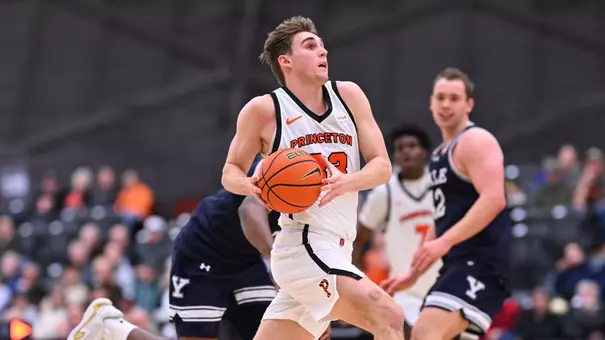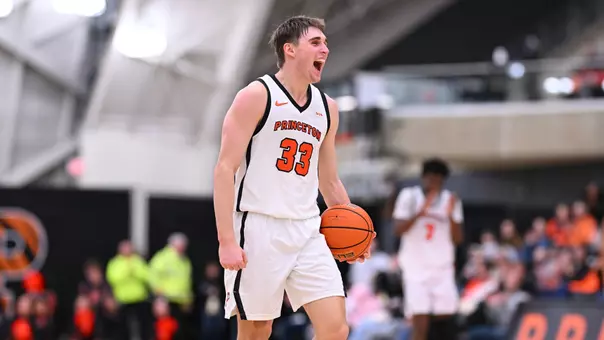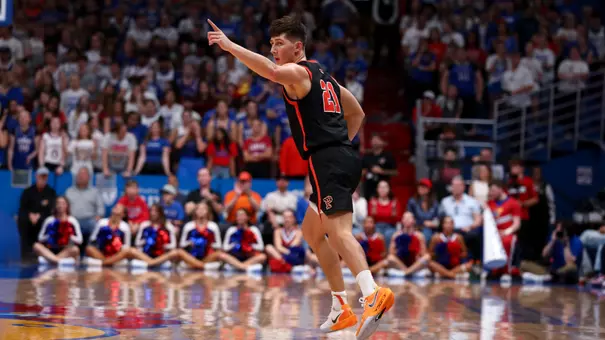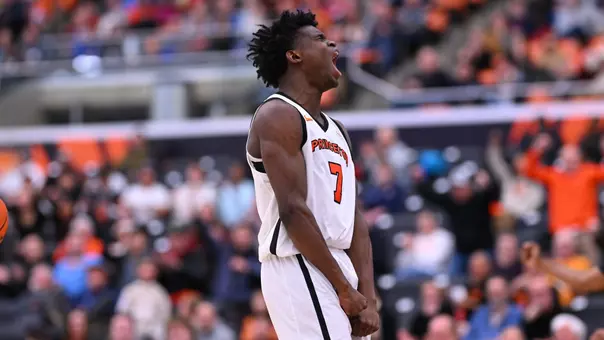Princeton University Athletics
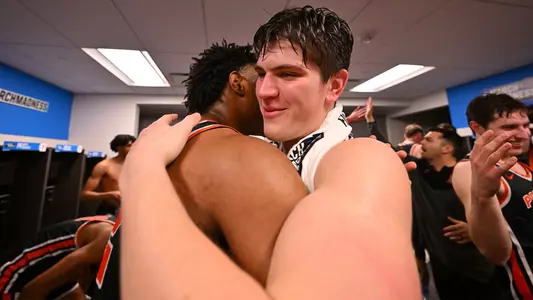
Feature Story On Keeshawn Kellman And Zach Martini: The Breakfast Club
March 22, 2023 | Men's Basketball
Zach Martini’s six-foot-seven-inch, two-hundred-thirty-five-pound frame is overwhelming a folding chair on the Princeton men’s basketball bench in Jadwin Gym. All around him is chaos, with television cameras, bouncing basketballs, reporters everywhere. The metal wheels of a cart add to the noise as it wheels in a giant cake, whose shape is modeled after the building itself. Everyone who wanders into the gym is offering congratulations, hugs, laughs.
This is what it’s like when you reach the Sweet 16 of the NCAA tournament, like Martini and his Princeton basketball teammates have (the Tigers will face Creighton at 9 pm Friday night in Louisville). Everything moves quickly. Everything around you is loud.
Martini is not immune to this. Every time he is able to briefly sit, there’s another request. First, he is interviewed by a television station from New York City. Then it’s a New Jersey college basketball writer. And then, well, who can remember? It just went on and on.
“So many things have happened at a fast pace these last two weeks,” he says as he takes a moment to look across the court. “Making it to March Madness? Not real. Wait? We beat Arizona? Well how about you go and beat Missouri too?”
Elsewhere in the gym, senior Keeshawn Kellman, too, is being asked questions. Kellman stands six-feet-nine-inches tall. He weighs in at two-hundred-and-forty-pounds. He doesn’t sit. He can’t. Every time he does, someone else says “Hey, you have a second?”
This moment, like so many others Princeton has experienced of late, is almost surreal. Princeton, as Martini said, defeated second-seeded Arizona and seventh-seeded Missouri last weekend to reach the Sweet 16 as a 15 seed. Its 78-63 win over Missouri was the largest margin of victory a 15 seed has ever had in the tournament.
With that success has come the kind of attention that only March Madness can bring. Early morning TV in New York City. Late night shows from Hollywood. Pretty much every sports talk radio station in between. They’ve all wanted in on the Princeton Tigers.
To get to this point, you need your stars to be stars. You also need your Kellmans and your Martinis to rise to the occasion. You need their size. You need their strength. You need their leadership. You need their desire. You need their composure.
You need your Breakfast Club. None of this is happening in Jadwin Gym, none of this national attention is coming Princeton’s way, without Keeshawn Kellman and Zach Martini. They are Princeton Basketball’s “Breakfast Club.”
Keeshawn Kellman is a first generation American. Zach Martini’s father played football at Lehigh. Keeshawn Kellman speaks somewhat softly. Zach Martini does not.
If you really want to know the difference between the two of them, ask them what their post-Princeton plans are.
“I want to be in a position to give back,” Kellman says.
And Martini?
“I want to be the GM of the New York Jets.”
“Zach is one of the funniest people I know,” Kellman says. “He’s beloved on this team. Everyone loves him.”
“Keeshawn is a selfless guy,” Martini says. “He’s a team-first guy. It’s awesome when you see him at his best, pouring out raw emotion. It lifts everyone else.”
The two have a bond that is as strong as they are. And that bond, along with that strength, was cemented with what they came to call “The Breakfast Club,” as in “We’d skip breakfast and go lift.”
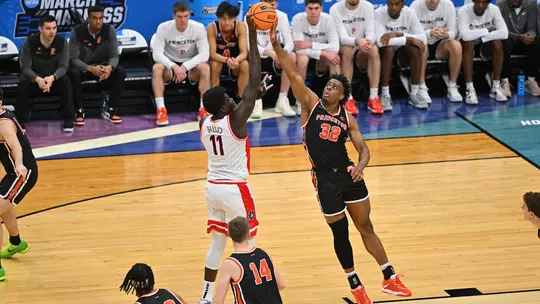
Arizona, the second seed in the South, led Princeton 6-2 after nearly three minutes of the NCAA opening round game between the two last Thursday. Arizona’s two leading scorers for the year were Azuolas Tubelis and Oumar Ballo. Here are two facts about those two: 1) they averaged 35 points per game between them and 2) they stand 6-11 and 7-0. The two were a main reason why so many predicted that the Wildcats had as good a chance as anyone to win the entire tournament.
How in the world would Princeton defend all that size? Of those first six points, Ballo had four and Tubelis had two. Now Ballo was going back for more. And then? Rising up to meet Ballo was Kellman, who swatted the shot away. It was, to put it mildly, attention-getting.
“He’s the physicality of the team,” says Princeton head coach Mitch Henderson. “He plays physically. That play was huge for us.”
“That’s when I knew we could play with them,” Kellman says.
Now it was late in the second half. Princeton had come from 12 points back at one point and now leads 56-55. Tiger ball. Game clock just above 20 seconds. Shot clock under five. The ball is in Tosan Evbuomwan’s hands, and he feeds it up top to Martini above the three-point line. There are three — three — Arizona players who are staring at him. What does he do? He sends a bounce pass through all three of them, to Caden Pierce on the backside. Pierce is fouled and makes both. Tigers by three. They win 59-55.
If anyone who has ever worn a Princeton uniform can appreciate what it takes to make that pass and the significance of that pass, it is Henderson, whose ability to throw those kinds of passes — “scoring passes,” his own coach, Bill Carmody would call them — is unrivaled in Princeton basketball history.
When the subject of the pass comes up, he laughs out loud.
“It was the biggest pass of the game,” he says, “by not the most gifted passer.”
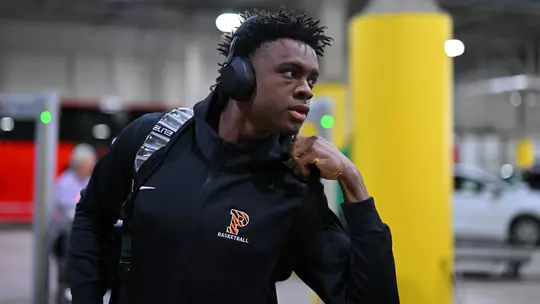
Keyshawn Kellman’s family comes from Guyana, a South American country that is north of Brazil, east of Venezuela. His parents Steffon and Kehinde were both athletes in their home country, in track, cricket and soccer. One of his uncles was a professional cricket player.
Kellman was born in Brooklyn, and he lived in New York City until he was four, when his parents moved the family to Allentown (the one in Pennsylvania). His father worked two and sometimes three jobs to make ends meet.
“My parents were such a big influence on me,” Kellman says.
He is sitting on a couch on Jadwin’s E Level. This is before all the March Mayhem upstairs on the main court. This is a rare moment these days, a chance to sit, relax and reflect.
“The culture they created at home encouraged me to work as hard as I could because I saw how hard they worked. They taught me to stay humble. Seeing how they live, the morals they have, that’s helped me to become a much better person.”
He took to sports an early age, playing football and soccer as a little kid, or as little as he could be. When he was nine, he went to the Eastside Youth Center and found a different sport.
“I saw a bunch of kids walking into the gym to play basketball,” he says. “I figured I wanted to try that too.”
By the time he was ready for high school, basketball was his only sport. He first attended the Lincoln Leadership Charter School for his first two years, where he was mostly a jayvee player. He then transferred to Allentown Central Catholic High, and if that sounds familiar to Princeton Basketball fans, it should. It’s the alma mater of Gabe Lewullis, another Princeton hero of March.
The next two years helped him really develop as a player, but he felt he wasn’t ready for college basketball just yet. Instead, he spent a postgraduate year at the Perkiomen School.
“We couldn’t believe no one else was recruiting him,” Henderson says. “He hadn’t played a lot of basketball, but he was a big, strong, powerful kid. There was a lot to work with there.
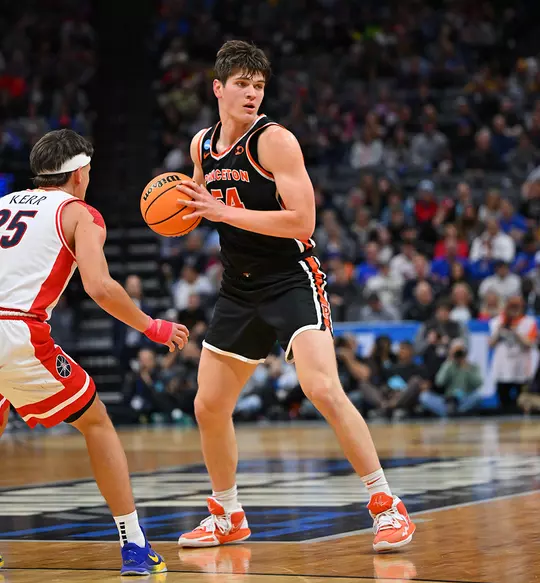
There was a lot to work with in Martini’s case too. If he looks like a tight end, that’s because he was one. Or maybe he still is. He plays with what he calls “a football mentality.” His coach has a different way of putting it.
“We have a saying,” Henderson says. “It’s ‘Run like Zach.’ That means ‘run as fast as humanly possible at all times.’”
Chris Martini (his father, since his mother is also named Chris Martini) was a linebacker at Lehigh. His younger brother Chad is a quarterback at Cornell.
Zach’s introduction to basketball came through shooting and playing pickup games on his driveway in Warren, New Jersey. He played football and basketball in high school, graduating from North Jersey’s Gil-St. Bernard School in 2020. Despite his size, he developed an ability to shoot from the outside and to pass based on the system his high school coach ran.
“My coach played a five-out,” he says. “Every player had to dribble, pass and shoot.”
Does that philosophy sound familiar at all?
He chose Princeton over Yale, based largely on the feel he got from being around the players on his recruiting trip.
“It was the right culture for me,” he says. “I could tell right away. These were the guys I wanted to be around.”
He was to become Kellman’s teammate for the 2020-21 season, after Kellman had been a backup to All-Ivy League center Richmond Aririguzoh. Then everything went off the rails.
If Jadwin Gym is minute-to-minute activity this week, it was the complete opposite three years earlier, after the Covid pandemic shut everything down just before the 2020 Ivy tournament. There would be no 2020-21 season for the Ivy League, but Kellman and Martini still made the most of the situation.
The two would get up early each day to work out in the bubble that covers Powers Field. Using the workouts designed by strength and conditioning coach J.D. DeVincenzi, the two met regularly, skipping breakfast to get their work done. Eventually, they began to call each other “The Breakfast Club.”
They did more than just build muscle during those early mornings. They also built a friendship, one that can be described, much like the two of them, as “strong.”
“That’s where I really met Zach,” Kellman says. “He has such a big heart. It was a great way to get to know someone. We were two big guys throwing up a lot of weight.”
“I’d like to say on the record,” Martini says, “that he is a very strong man.”
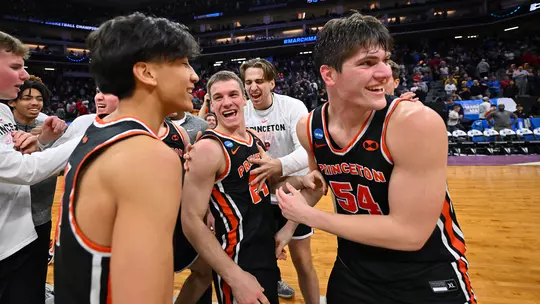
They finally got their chance to play a year ago. Martini had a supporting role, appearing in 16 games while averaging 2.2 points and 1.8 rebounds per game. Kellman played in only eight games due to a series of injuries and illnesses that slowed him down.
“What were they?” he says. “I had three or four ankle sprains. I was sick multiple times. I had Covid. I had a calf strain. I had a groin and hip problem. I have no idea why. I guess it was just bad luck. But it’s easy to think that things didn’t go right for those first fews years, but I believe there’s a lesson to be learned in anything that happens. Being behind Richmond was very valuable to me. He was a mentor to me, an older brother to me.”
And all of the injuries?
“I wanted to get in shape. I wanted my senior year to be special.”
The 2021-22 Princeton team won the outright Ivy League title but lost in the final of the Ivy League tournament to Yale. After the ride back to Princeton from the tournament at Harvard, the Tigers found out they were playing at VCU in the NIT.
As that news was coming through, there was a sound that came from a Jadwin side court. It wasn’t the staccato of the bouncing of a basketball. It wasn’t the swish of a ball through a net. It was a whispy sound, over and over and over. It was a jump rope. Kellman’s preparation for his senior year had begun.
“I was frustrated,” he says. “It’s something I do. Jump rope.”
Coming into this season, Kellman had dropped 25 pounds and was completely ready to go when practice began. So was Martini, until October 8 rolled around.
Now it’s five months later. He turns and points to a spot on the court. That’s where he took the charge that nearly ended his life.
“I thought I’d hurt my shoulder,” Martini says. “Maybe two minutes later, I couldn’t breathe.”
As it turned out, it wasn’t his shoulder. It was a collapsed lung. Within minutes he was on his way to Princeton Medical Center for emergency surgery. He’d spend five nights in the hospital. Even when he came back, he wasn’t sure if he could bring himself to play again.
“I wasn’t sure I’d be able to get over the mental hurdle,” he says. “I wasn’t sure I’d be able to play again. I really wasn’t sure if I’d be able to take a charge.”
His first appearance of the season came on Nov. 30 against Cairn. His second game was at Drexel, where he drew his first charge.
“This all has gotten me to appreciate the opportunity to play basketball even more than ever,” he says. “It hasn’t changed the player I am, and I’m really happy about that. To have that happen in October and to be here now? It’s crazy.”
It’s one more thing to throw on the craziness of this season. Kellman began the year with a 21-point game against Hofstra in which he shot 9 for 9 from the field. His next game was a 20-point outing against Navy. He’s been in double figures 10 times this year, and he’s averaged eight points and 4.6 rebounds while playing 17 minutes per game.
“Sometimes the potential of somebody is intoxicating,” Henderson says. “For him, in his head, it was always ‘I have to be this monster player and get every rebound and score 18 a game.’ For him, just being solid is excellent, and he’s been excellent in this run. He’s also a leader. He’s just loved on this team. He’s funny. He can imitate me. He likes the moment. He likes to impact the game, and that’s what he’s done.”
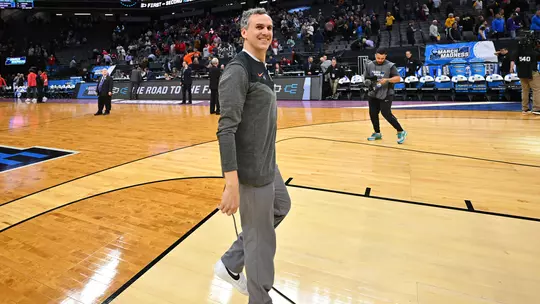
Back from his nearly career-ending injury, Martini played in 23 games this season, averaging 4.2 points and 2.7 rebounds in 14 minutes a night. An overwhelming majority of his field goal attempts (69 of 88) were three-pointers. He twice hit 4 of 6, against Yale in the regular season and then against Penn in the Ivy tournament.
“It was scary when he had to go to the hospital,” Henderson says. “I think he really learned how much he loves to play. When he made four three’s, he started to say ‘I should have done this better or I should have done that better,’ and I cut him off and said ‘no, no, no. You did this.’ If you could measure the size of heart, I think Zach’s would be just a little bigger than everyone else’s.”
Princeton needed to rally from a 19-point deficit to beat Penn on the final day of the regular season to earn a share of the Ivy League championship. That was less than three weeks ago. Then, in the Ivy League tournament, Princeton had to beat Penn again and then figure out Yale, who had swept the Tigers during the regular season. The Tigers did both.
Then it was on to the NCAA tournament. Princeton drew Arizona, in Sacramento.
“I grew up wanting to play in March Madness,” Kellman says. “I saw it on TV every year. The atmosphere. All the players on the big stage. It was humbling to be a part of it. I couldn’t imagine what we were going to see when we got there. All I had for reference was what I saw on TV. It all hit me when we got there.”
Princeton’s game against Arizona followed the game between Missouri and Utah State. The Tigers were able to watch a bit of that one while they waited.
“I looked around the arena, and my legs were shaking,” Martini says. “I didn’t have much control for about 10 seconds. After that, it was a basketball game. It might not have been Jadwin, but it was just another basketball game.”
That’s not entirely true. It was a bigger stage, and a much bigger opponent. Princeton needed every ounce of the strength that was born on those early morning workouts in the bubble by Kellman and Martini, and they got it.
“I love being the undersized guy,” Martini says. “We were the underdogs, so we could just play free and easy. I think we left it all on the court.”
Their numbers might not have been huge, but they did what was needed most. They were physical. They defended the two Arizona big men. Kellman had several dunks. Between them they had 15 points and 11 rebounds. Martini’s 29 minutes played in the game more than doubled his season average.
“They were both tremendous,” Henderson says.
Then came the second round against Missouri. This time they went for 11 points and six rebounds while again being defensive beasts. Unlike the Arizona game, Princeton pulled away from Missouri early in the second half. The last few minutes of the game were a Princeton party.
“That game was so much fun,” Kellman says. “Ryan [Langborg] and Blake [Peters] shot the lights out. Cade [Caden Pierce] was grabbing every rebound. We all played out best basketball at the same time, and everything was clicking. The atmosphere was crazy. Everyone was cheering for us, except the Missouri fans. It was just amazing.”
That party has continued in the days since.
“Literally everywhere I looked on social media, we were there,” Kellman says. “Everyone was congratulating us. Every student I saw congratulated me. We’ve really felt the love.”
It’s back to work Friday night. The next challenge is another huge one, this time a Creighton team whose best player is 7-1 Ryan Kalkbrenner, who is averaging 20.5 points per game in the NCAA tournament and who shoots better than 70 percent from the field for the season, second-best in Division I.
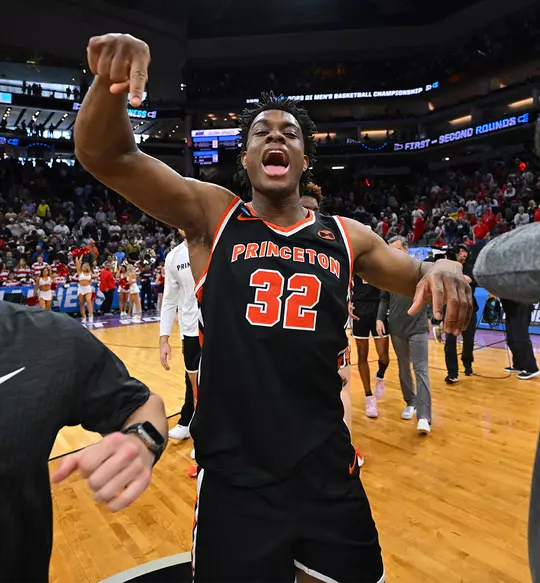
Eventually, Jadwin returns to a normal practice, or at least a practice as close to normal as it gets with the Tigers in the Sweet 16.
The media heads on its way. The players get back to business.
Outside, it is a sunny, warm day. Spring has begun. Stepping out the front door of Jadwin, you can see the football stadium framed by blue skies. The bubble is still up, and it's hard not to think of those Breakfast Club mornings, all those early lifts, all those days of wondering when, if, how, they would get to play.
What would their future be? What would be their team's future? Keeshawn Kellman and Zach Martini have those answers now. They are simple: Their team's future would be historic. Their own futures would be a huge part of why.
In this moment of March Madness taken to an extreme, those days seem really far away.
— by Jerry Price
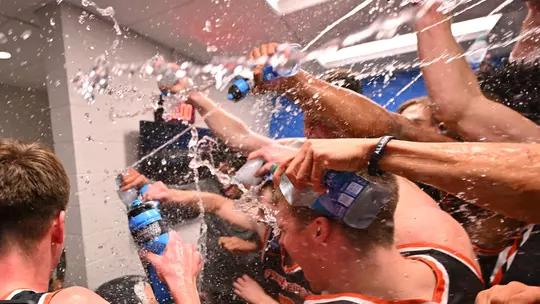


.png&width=24&type=webp)








